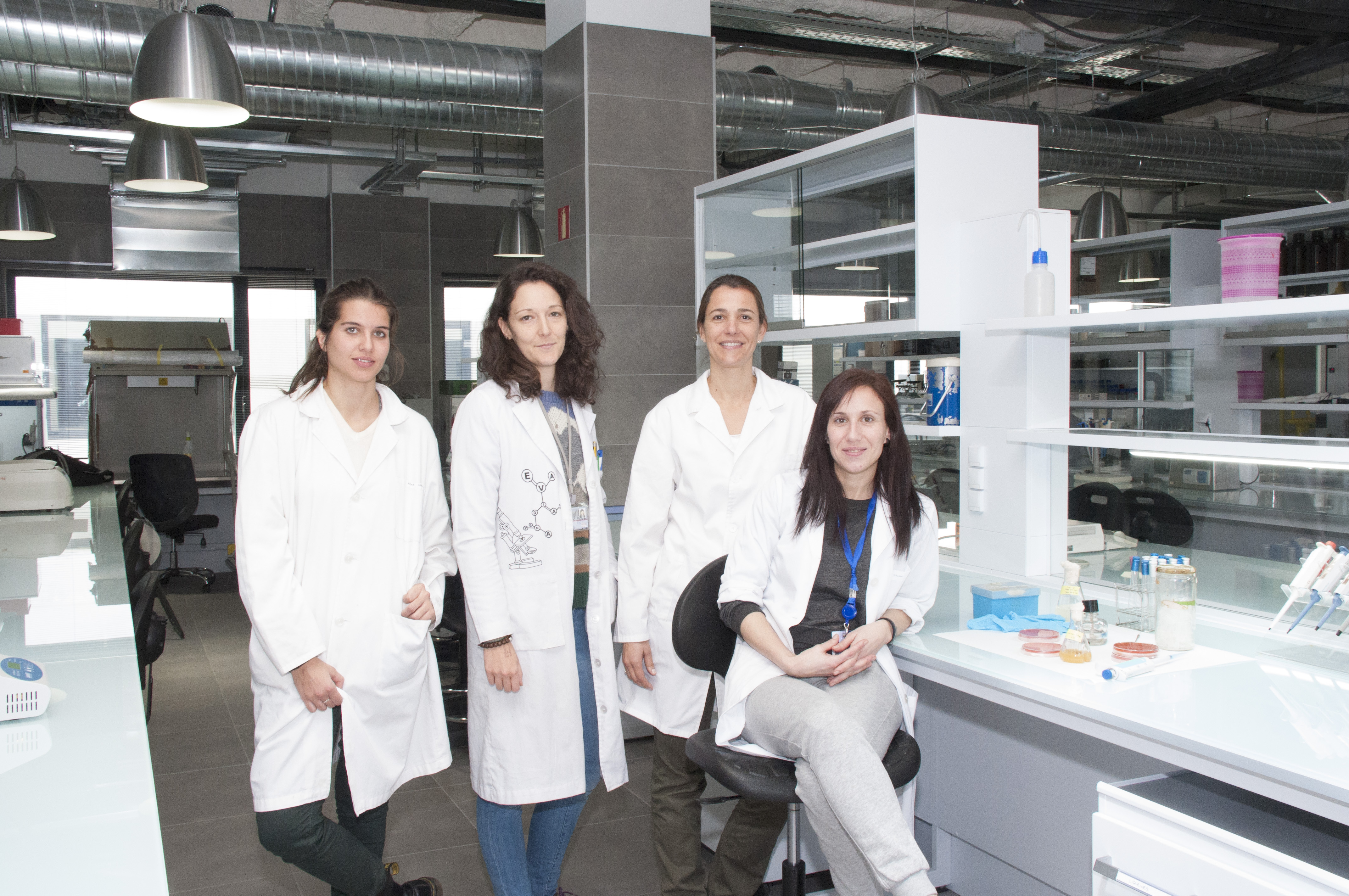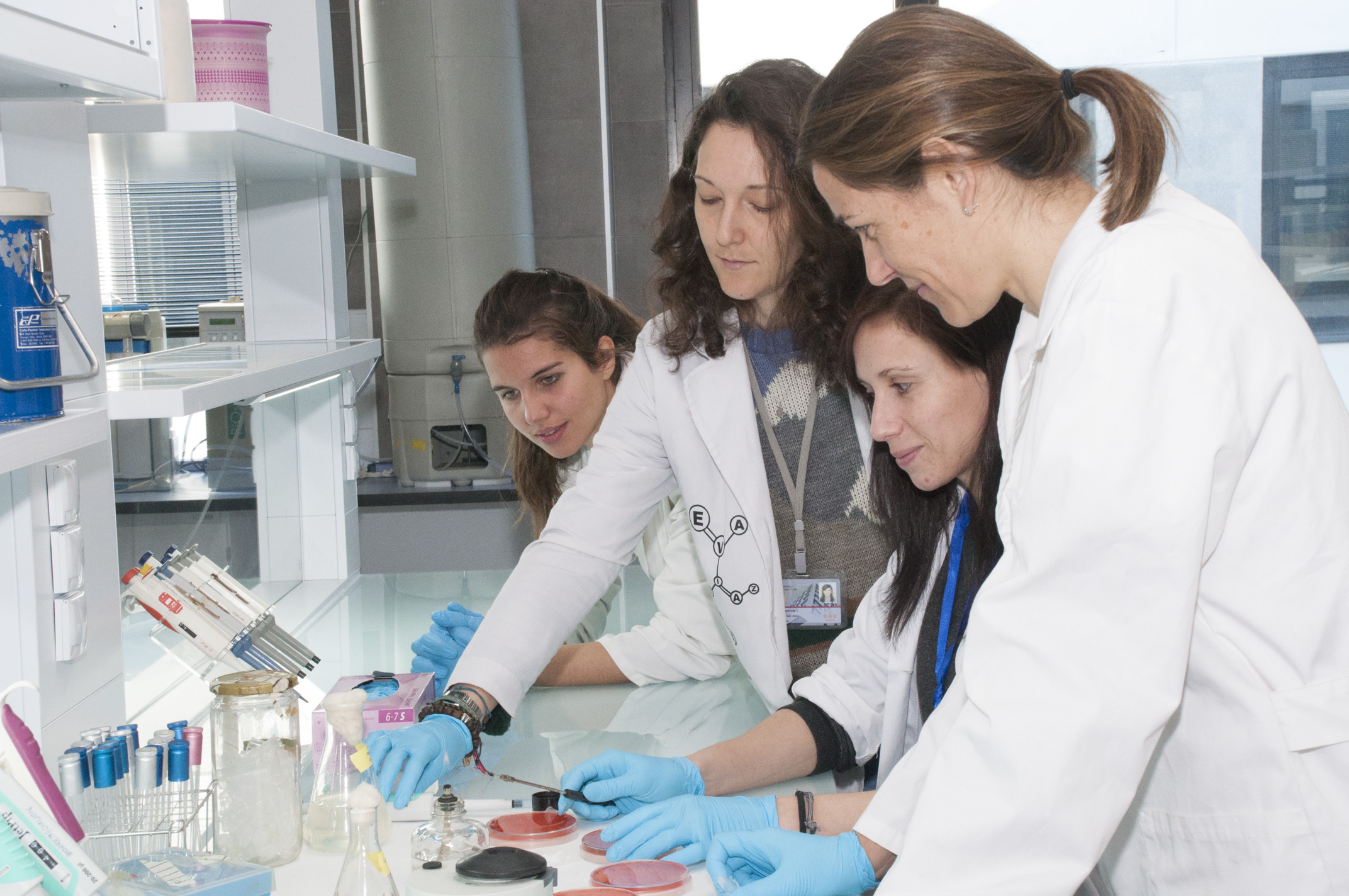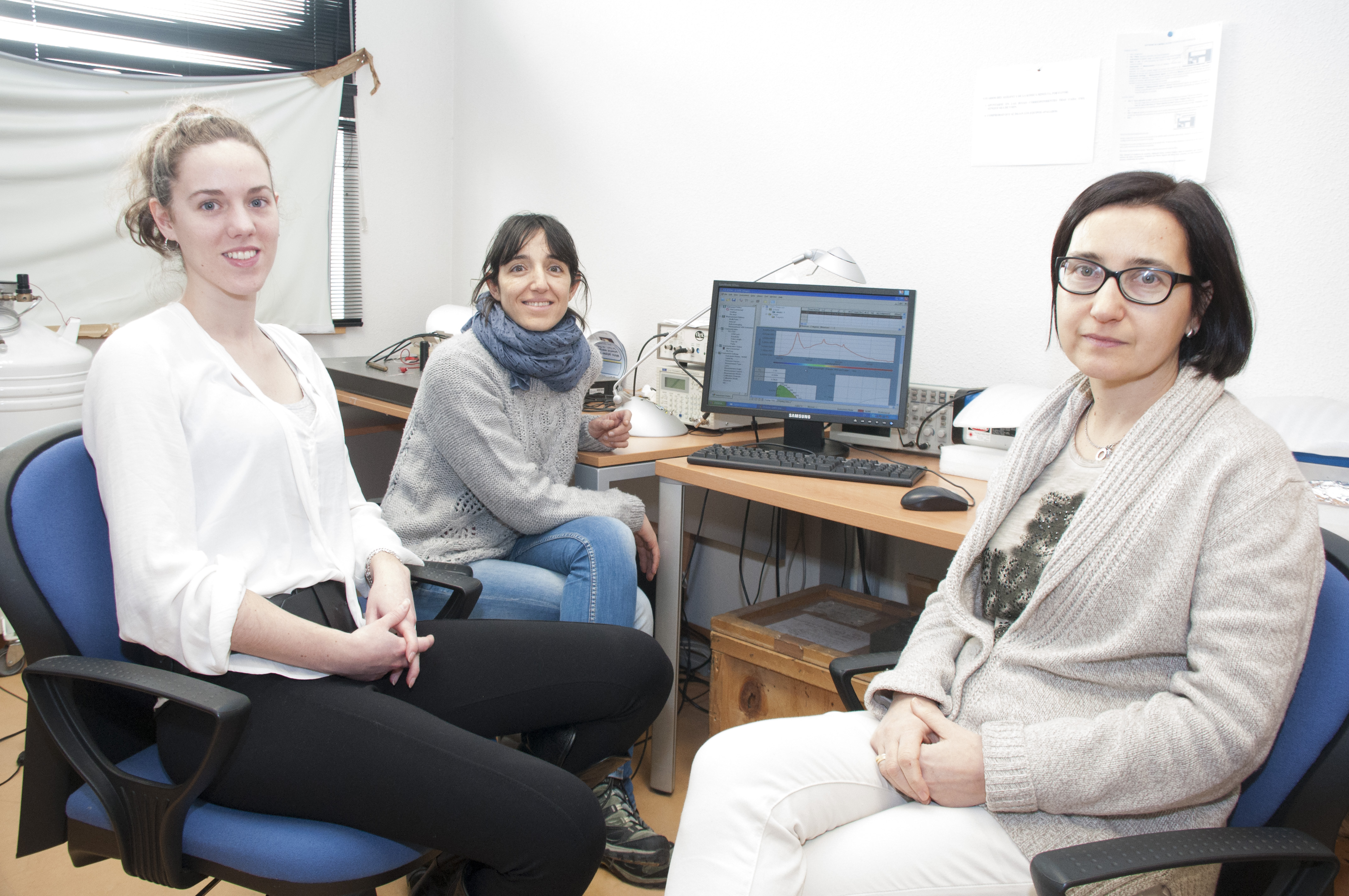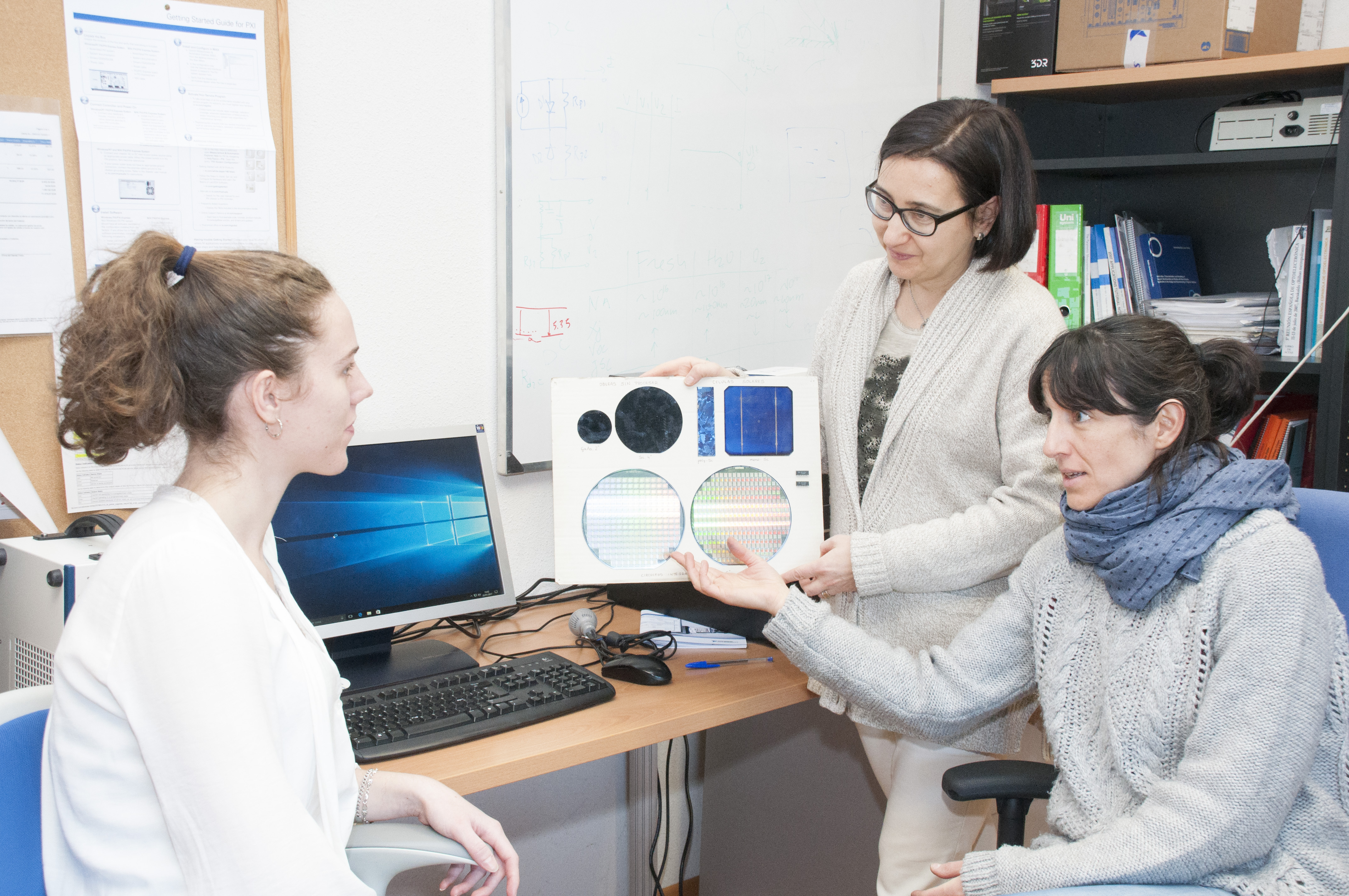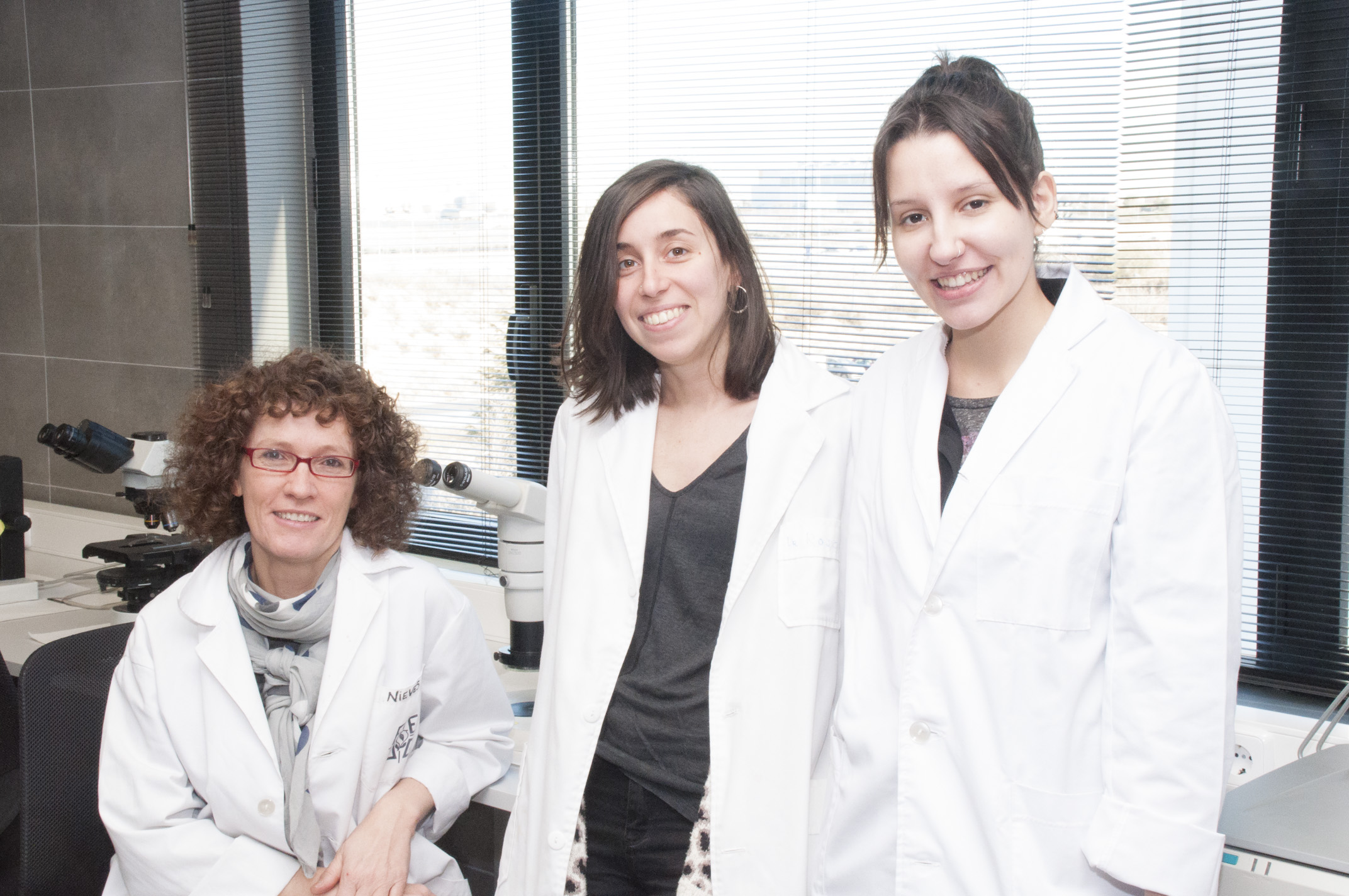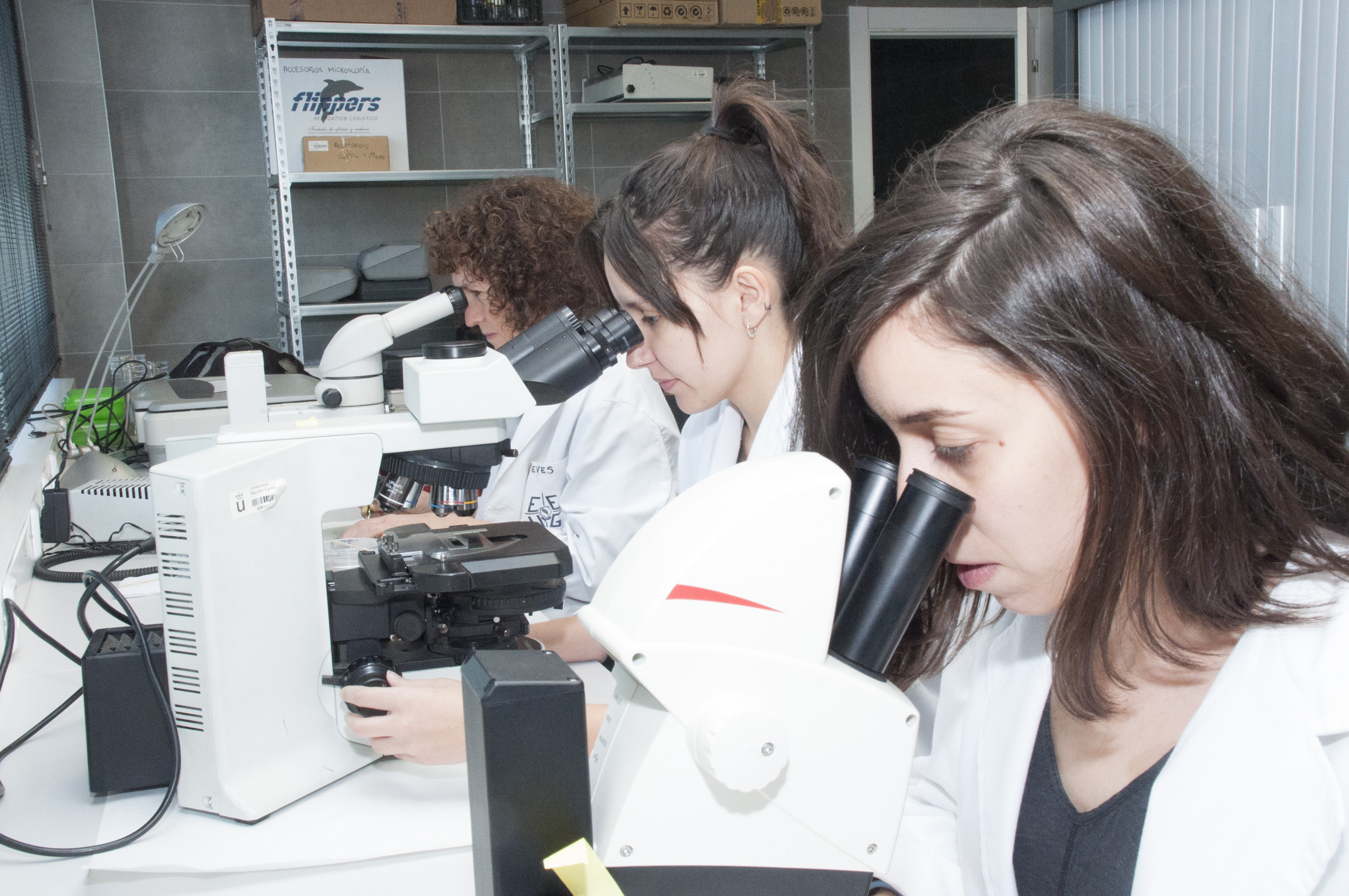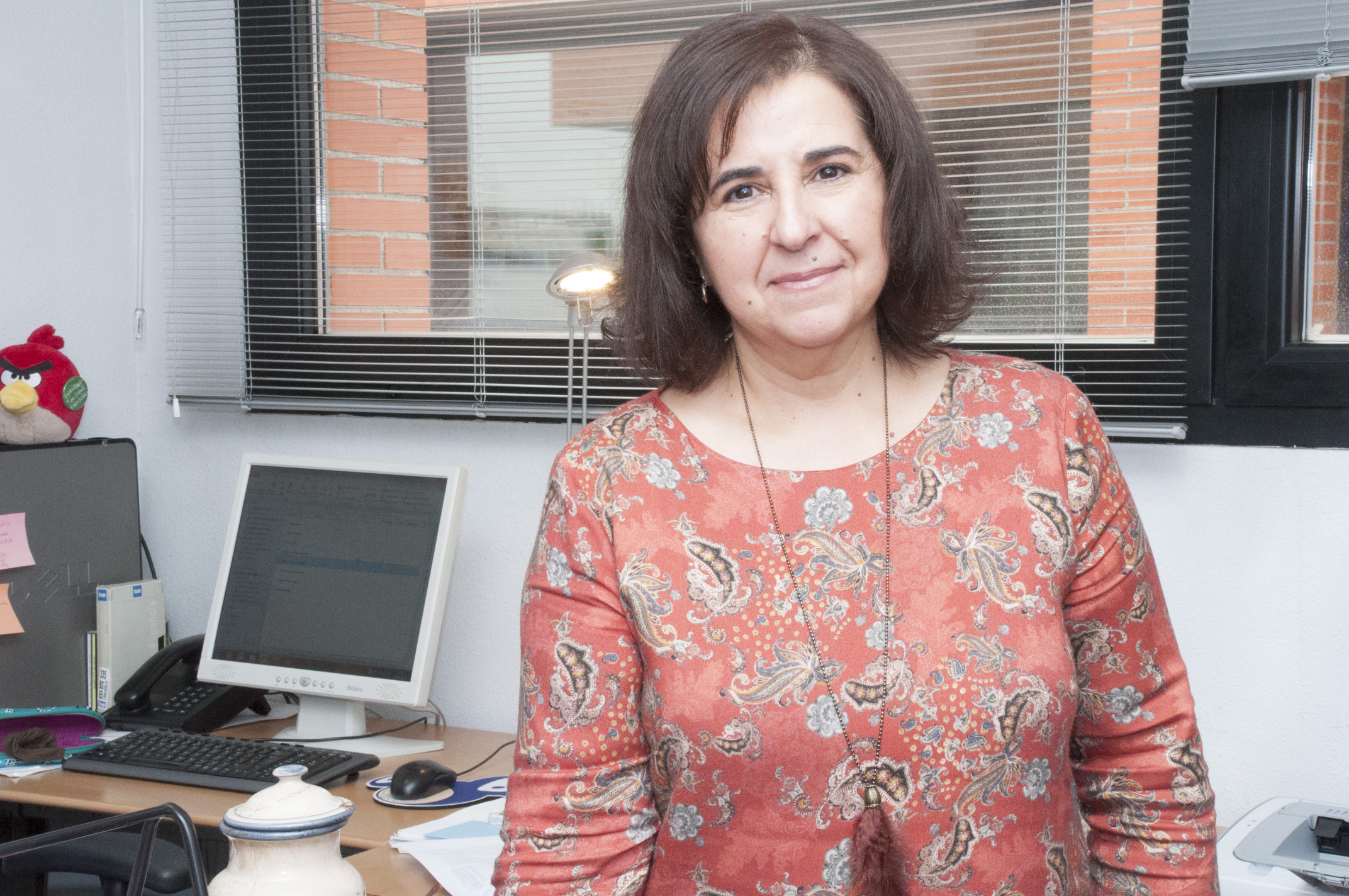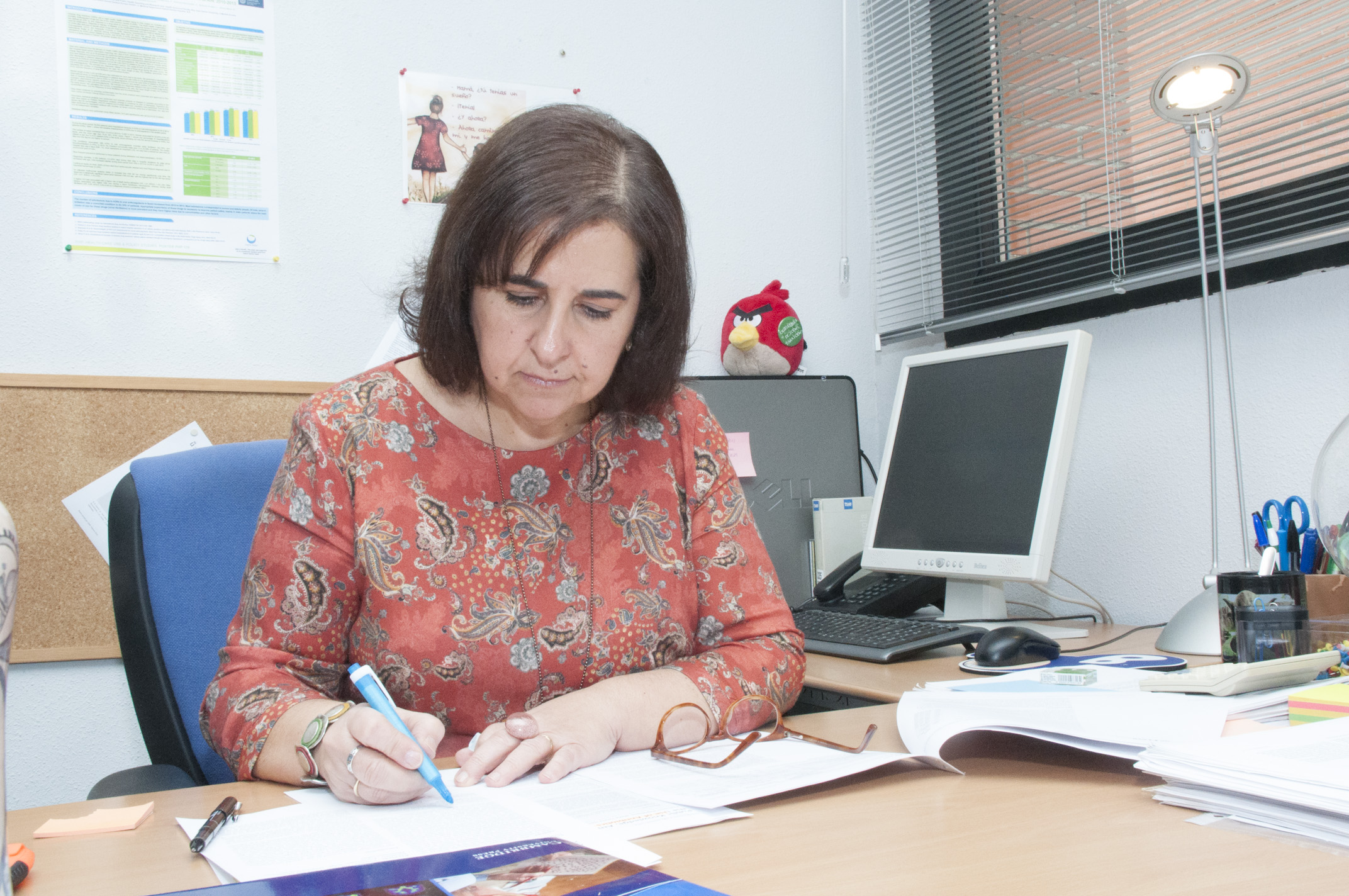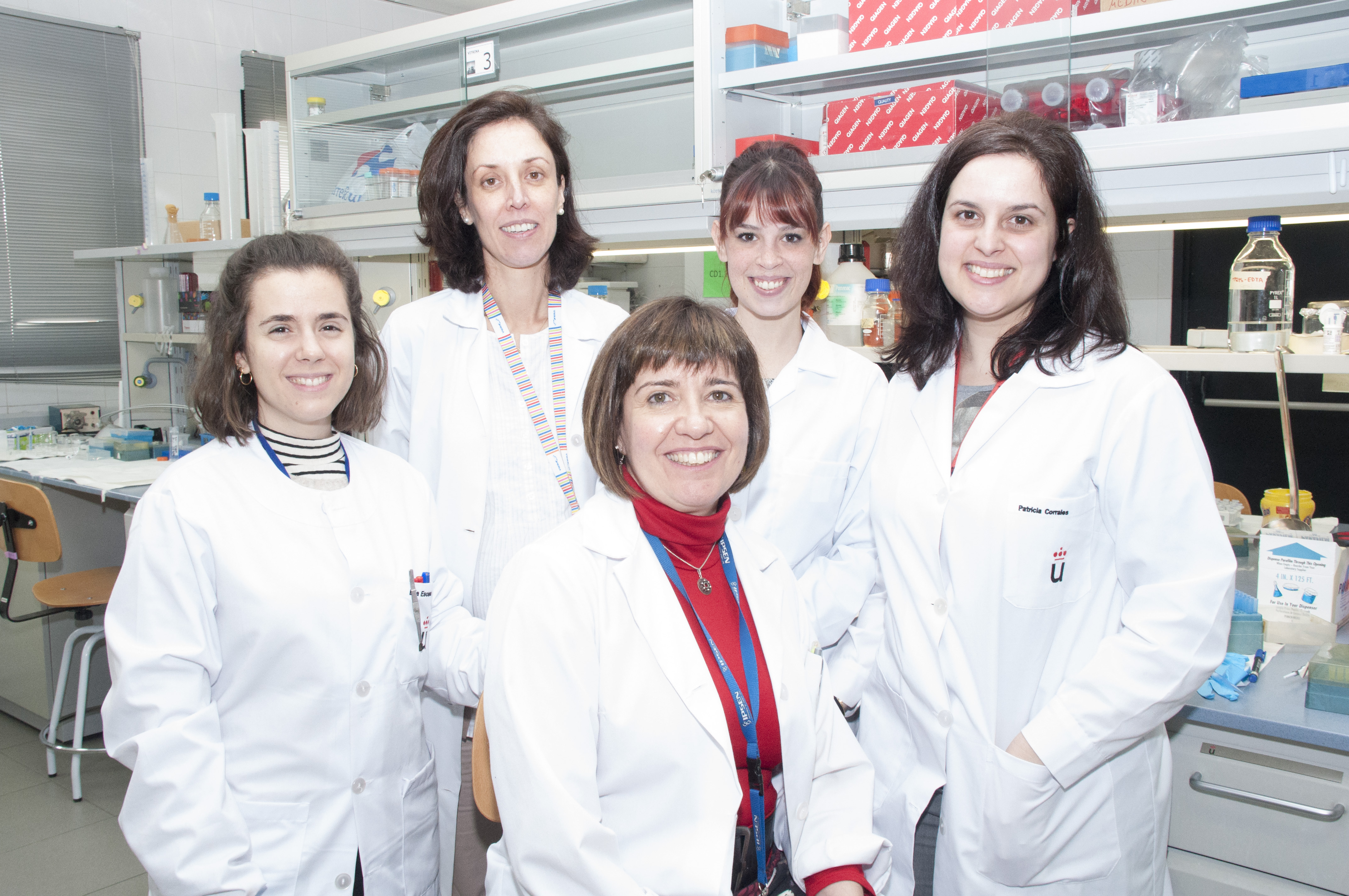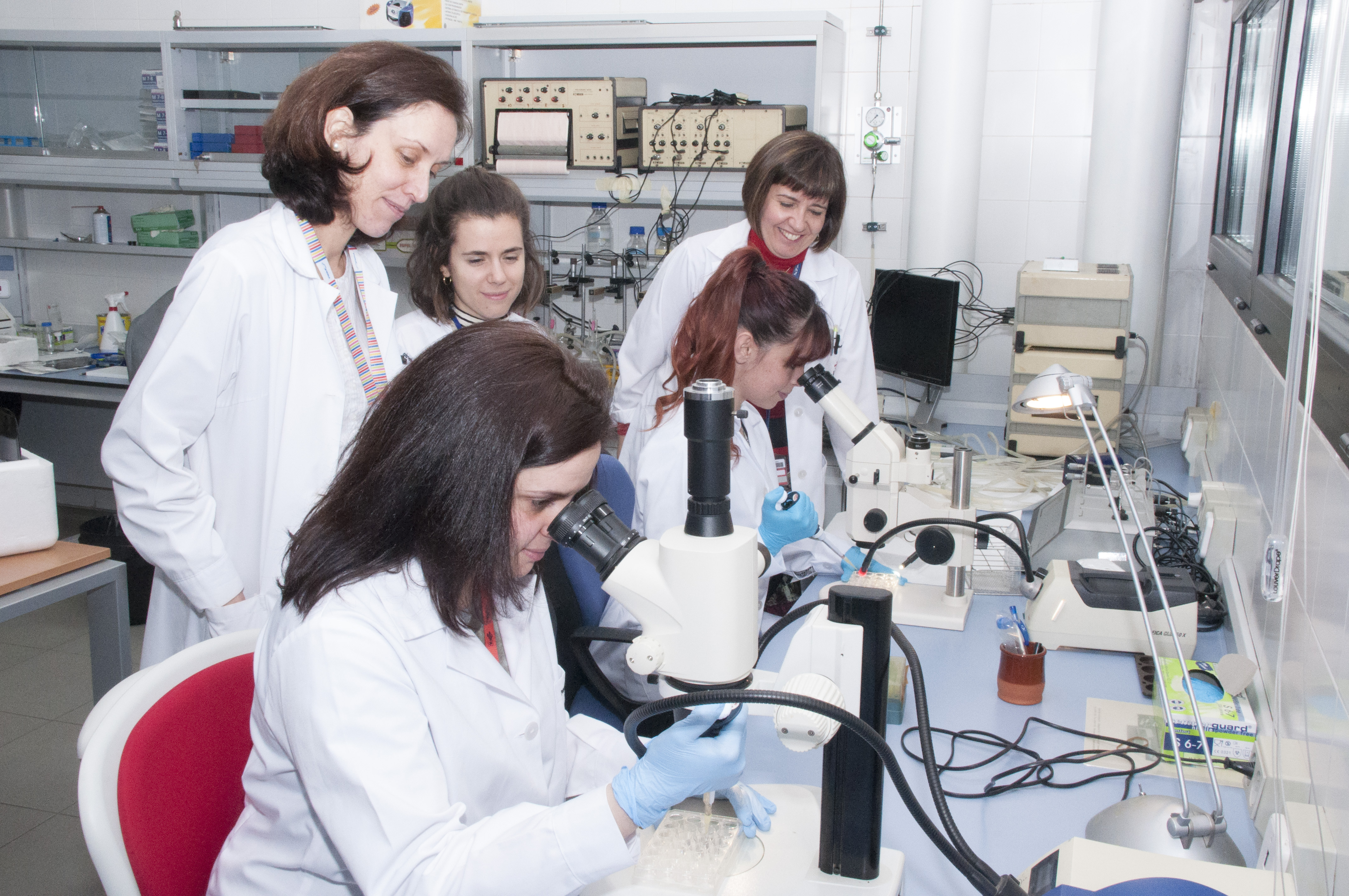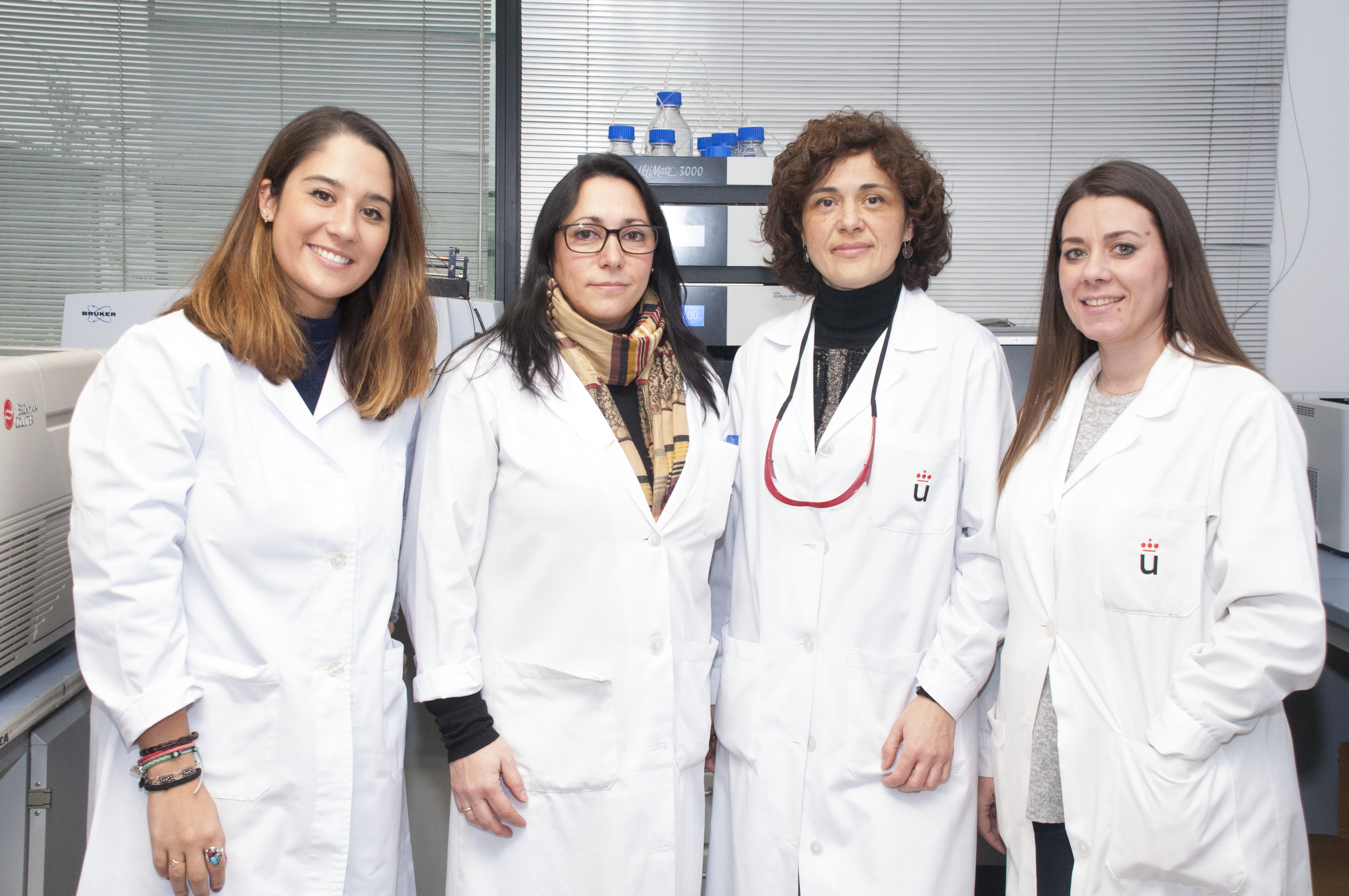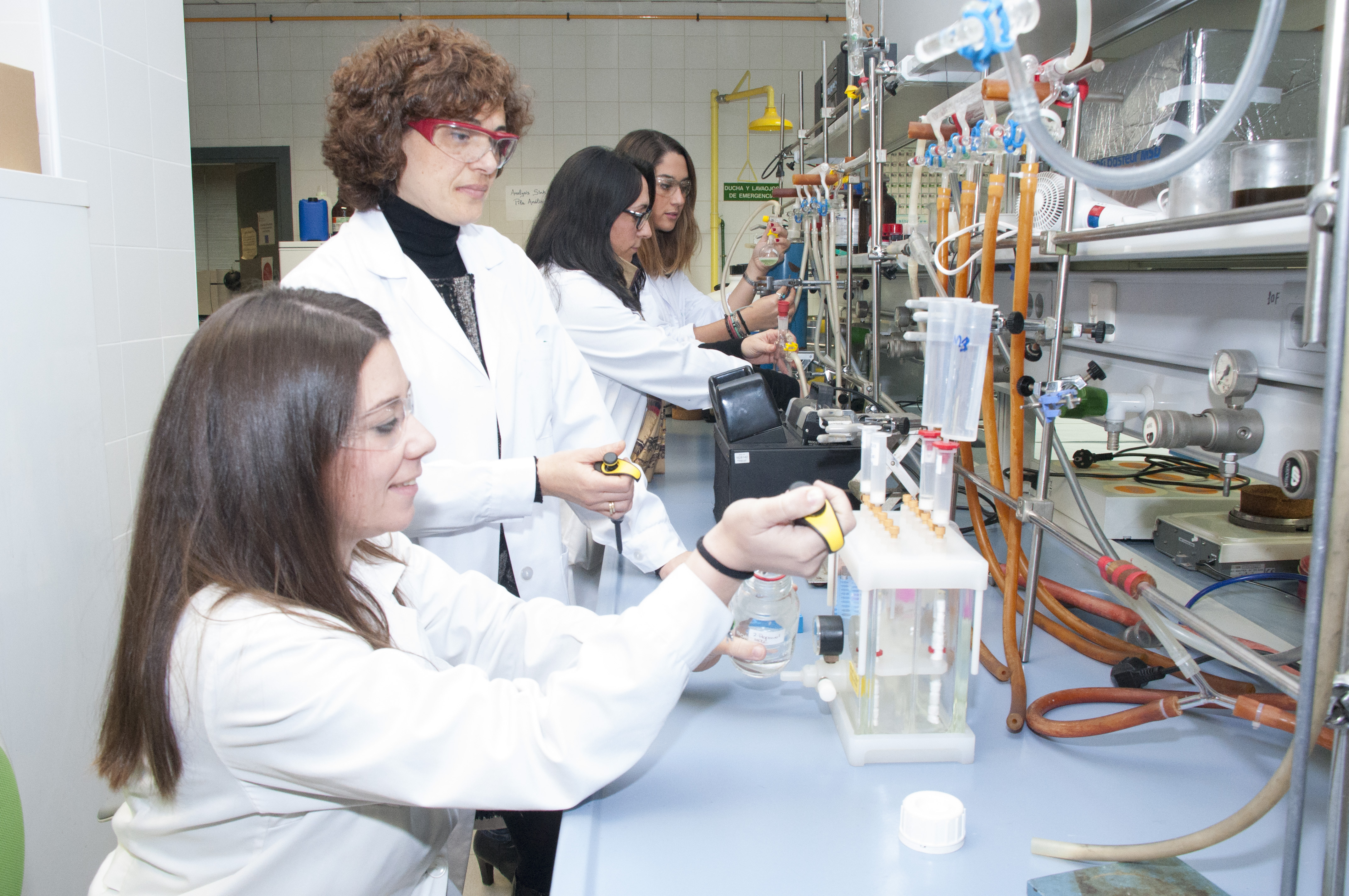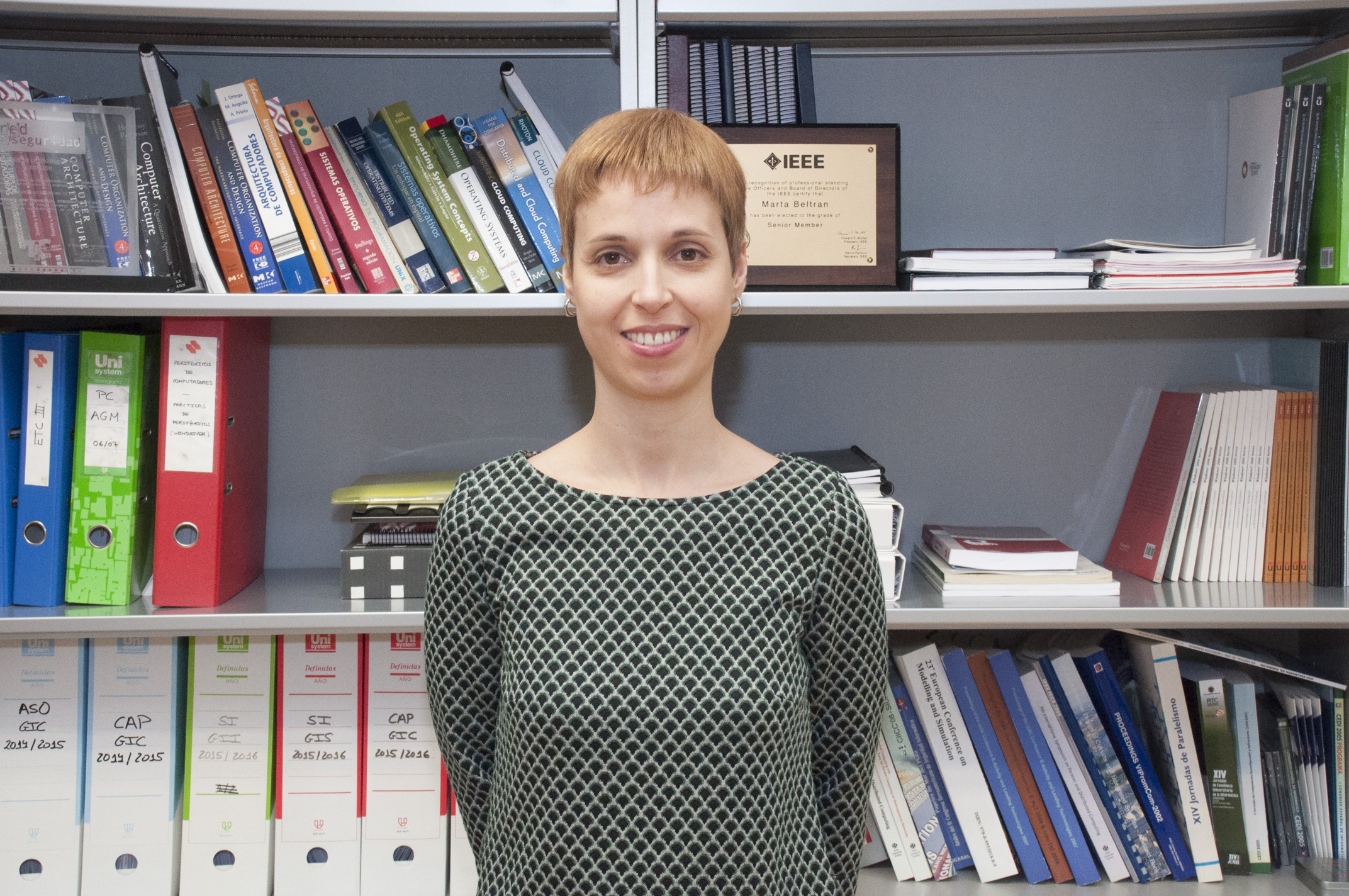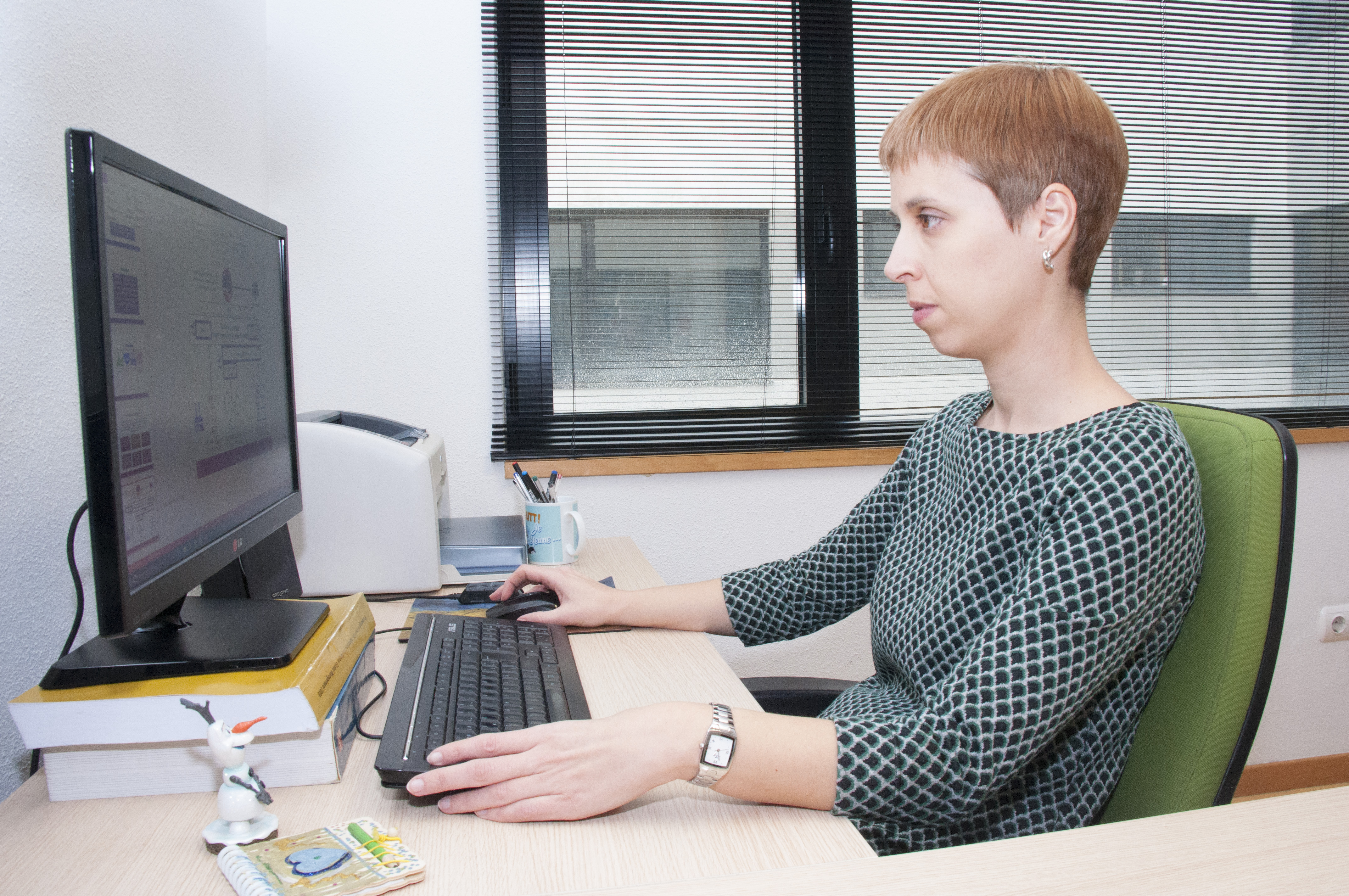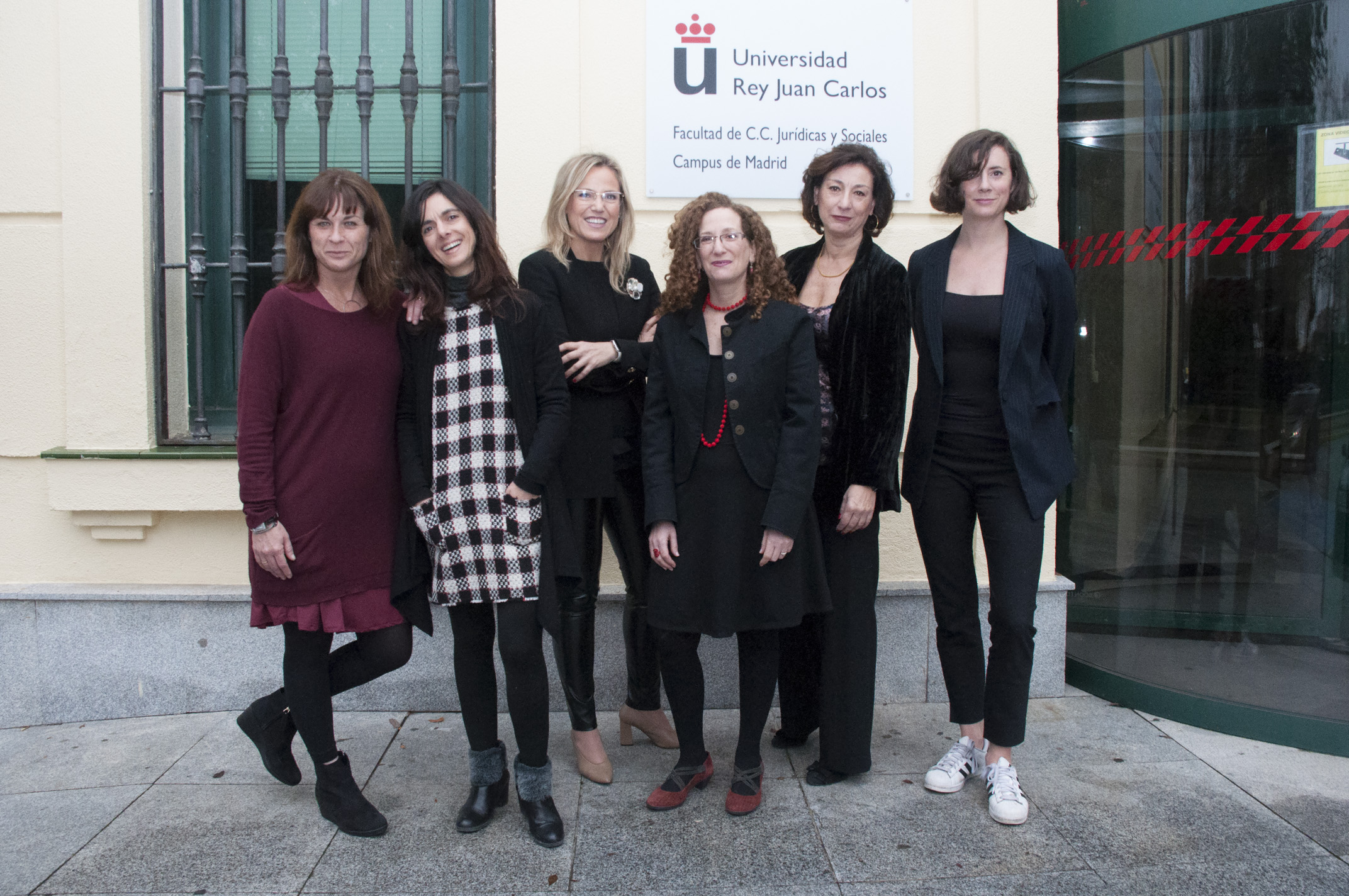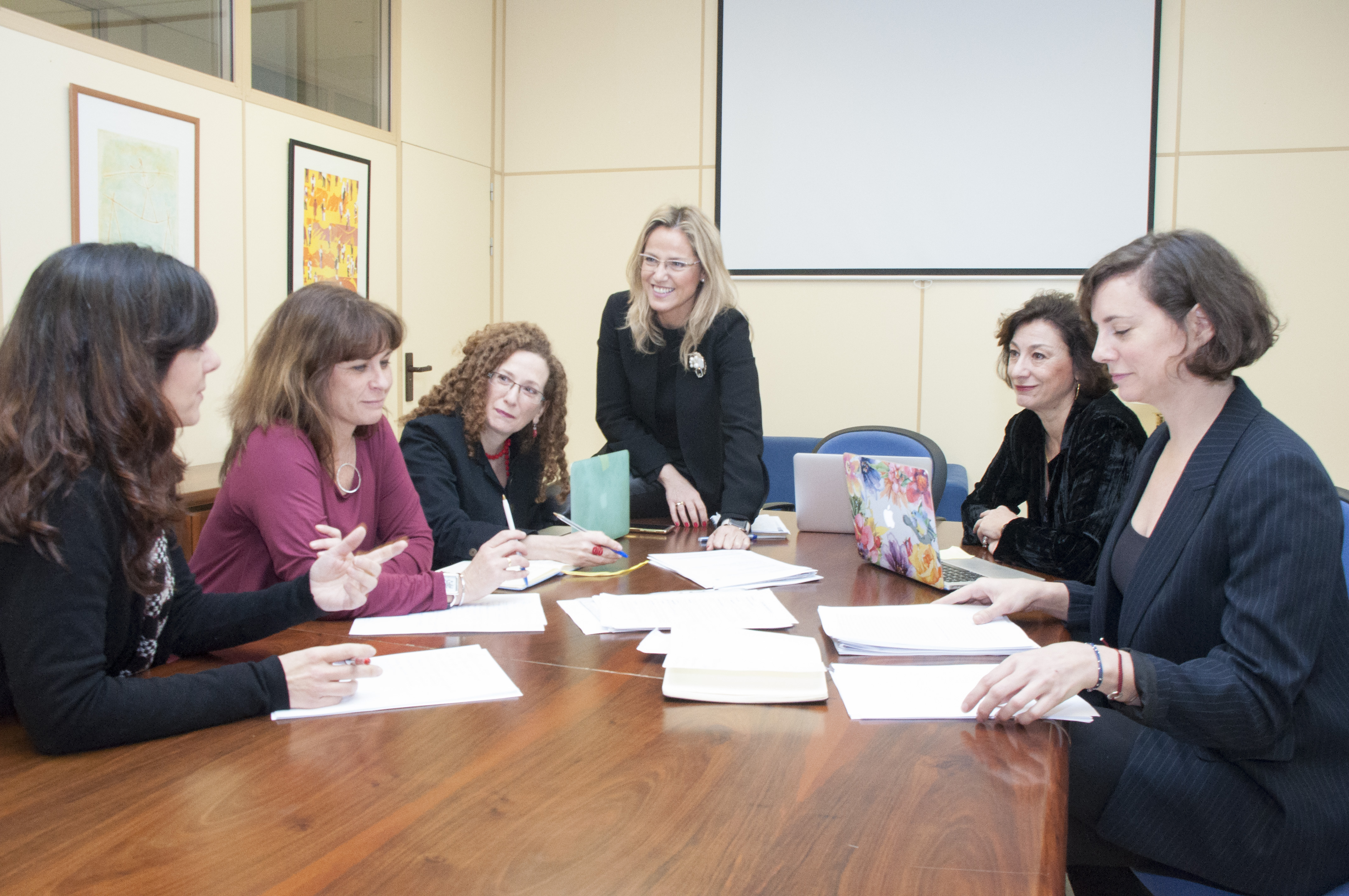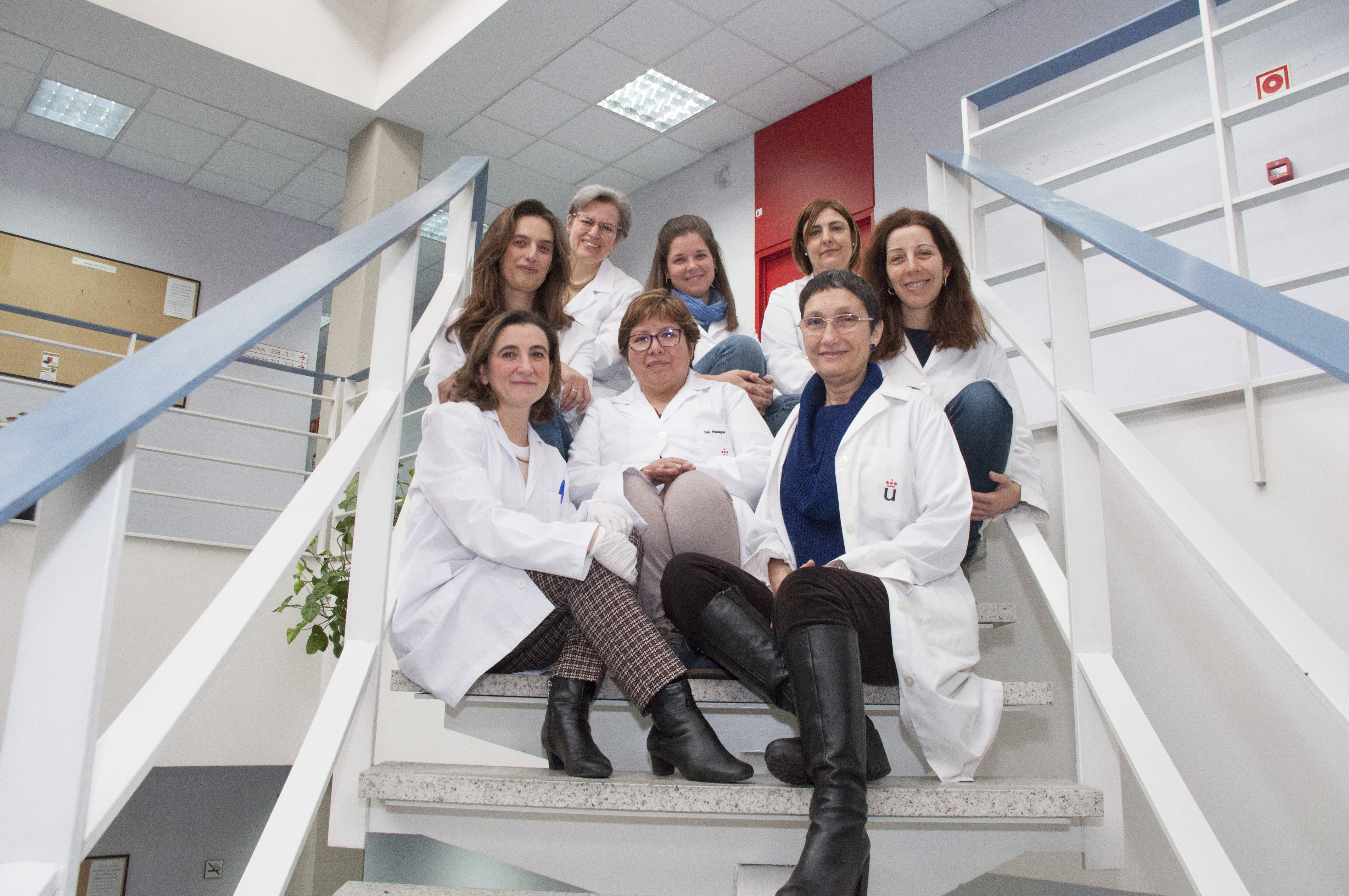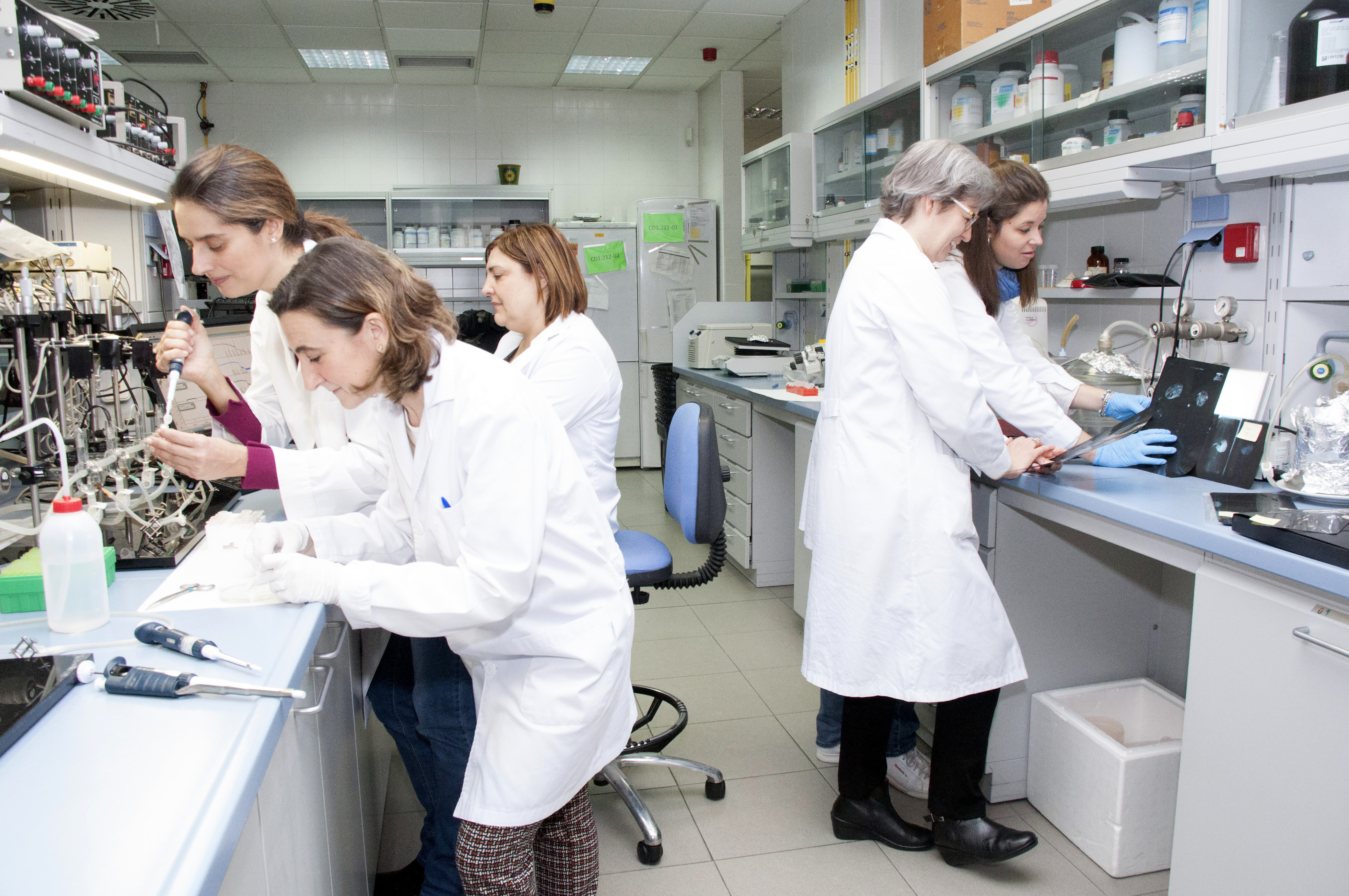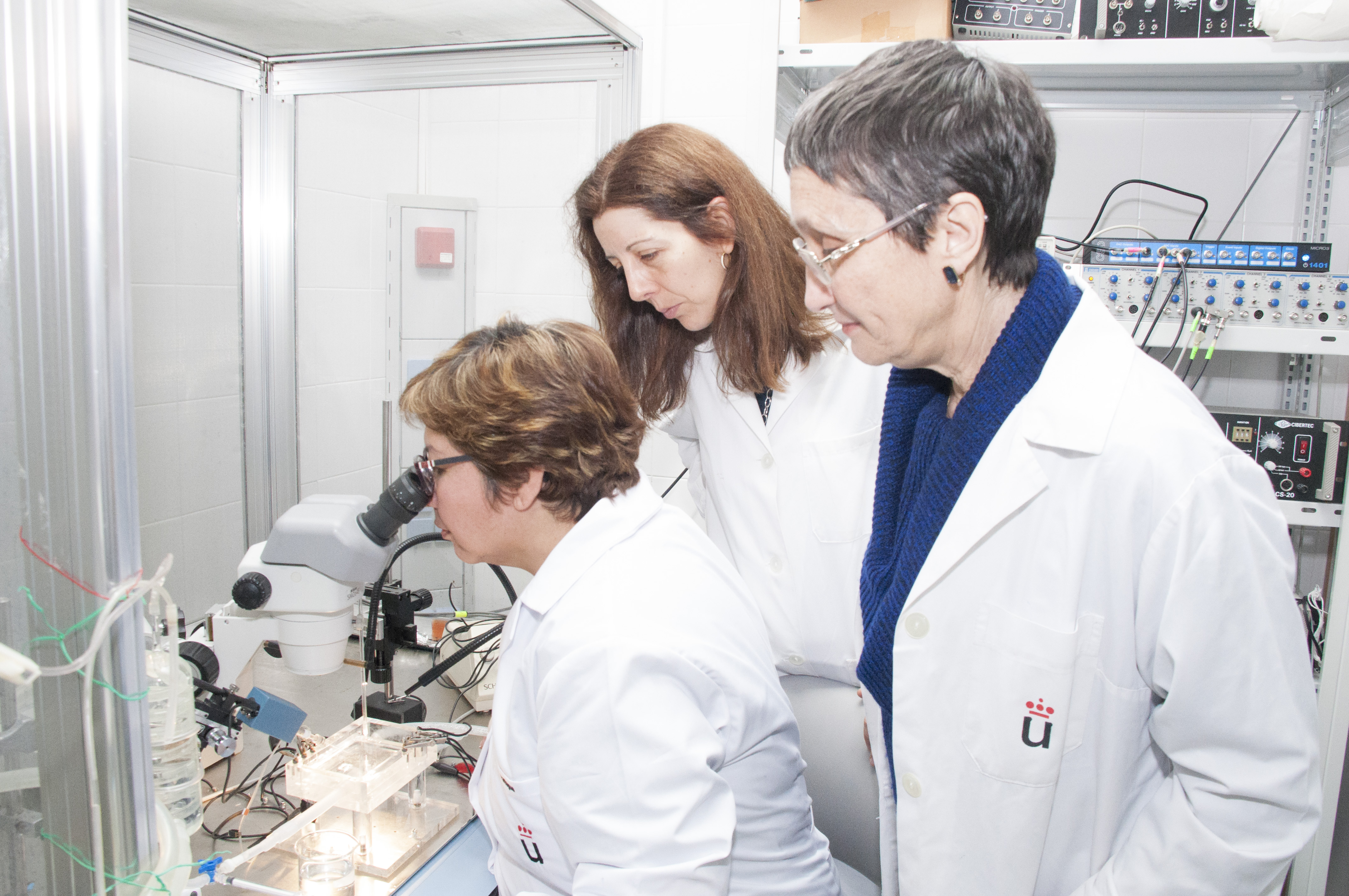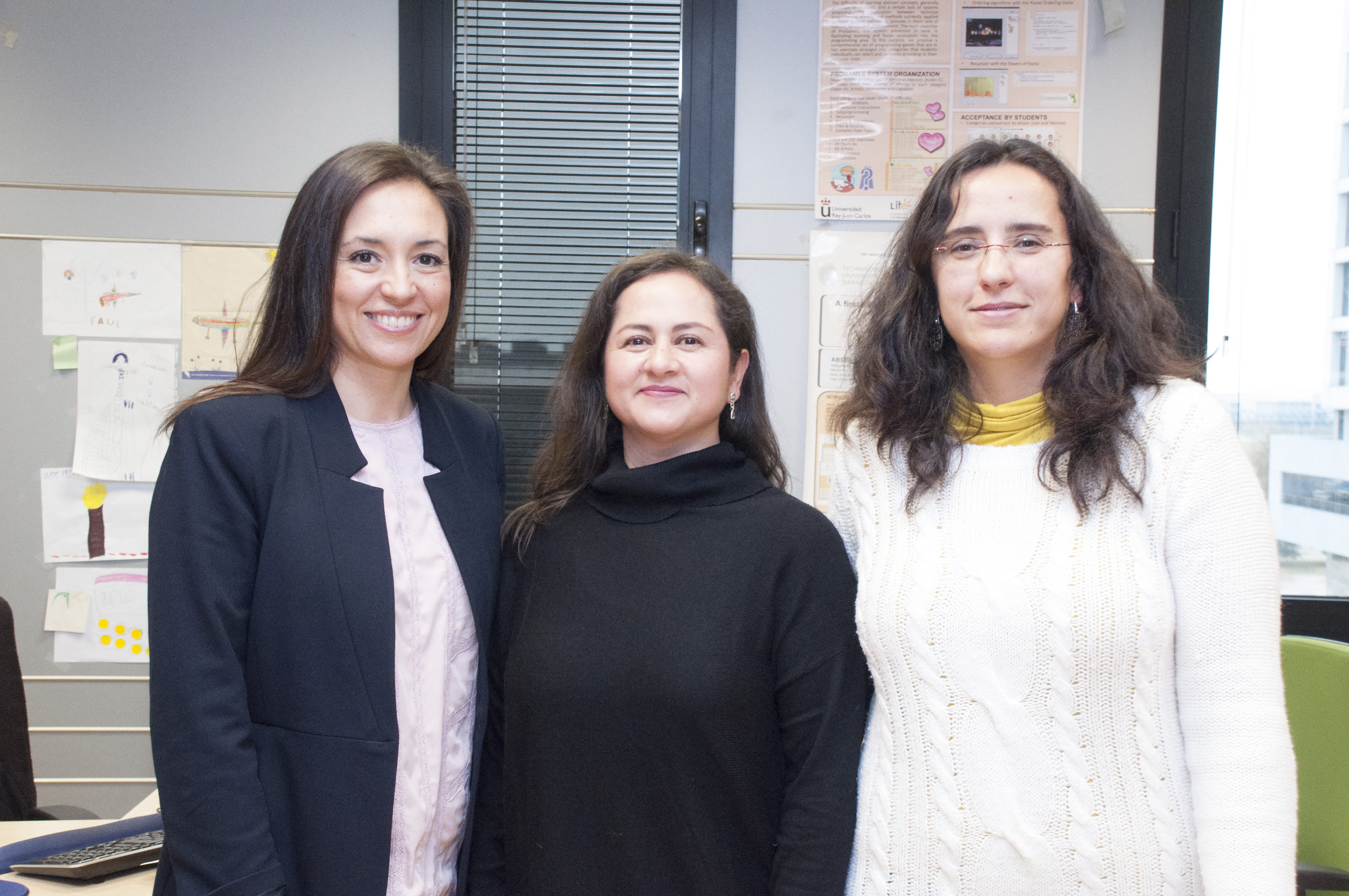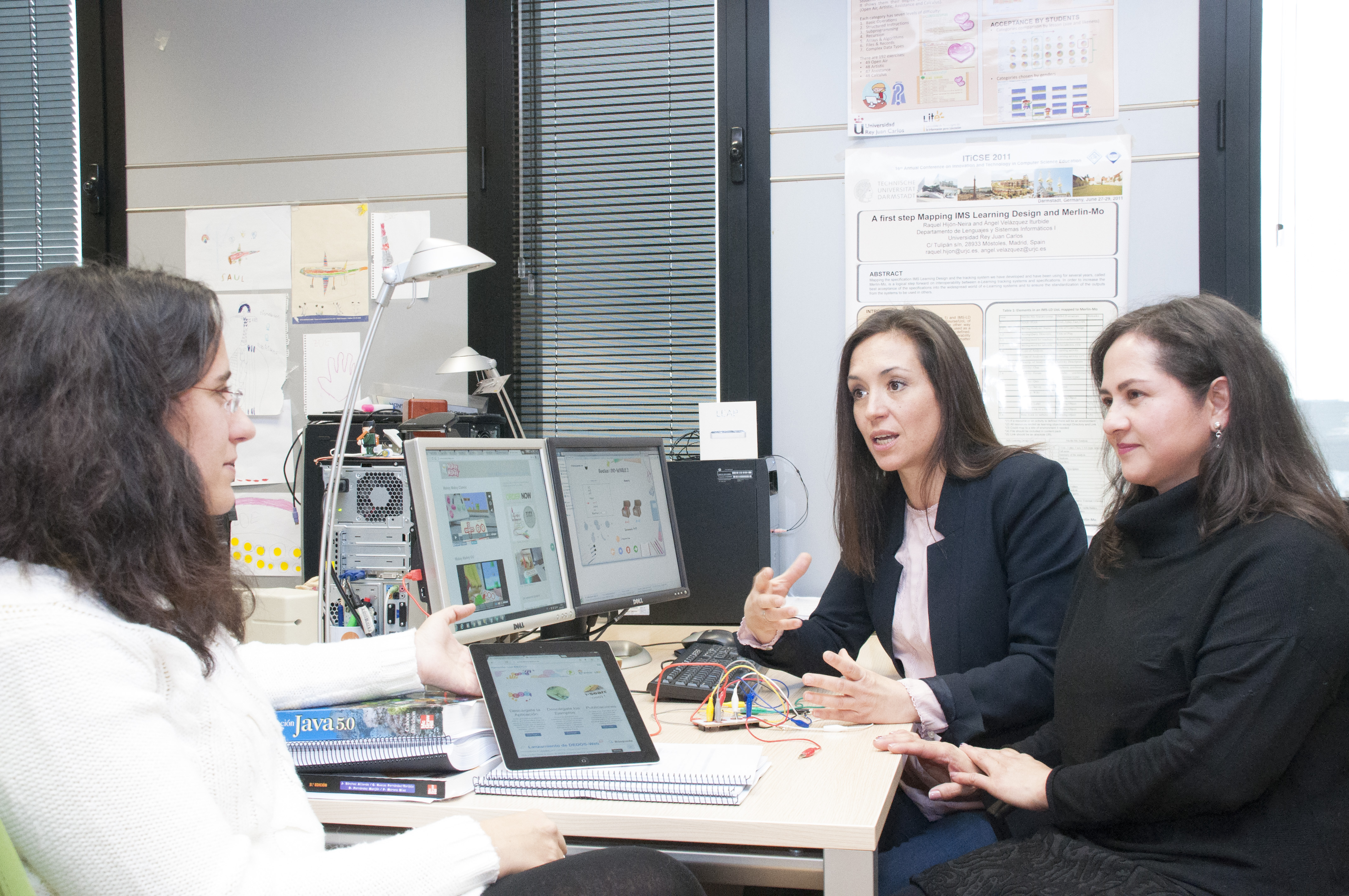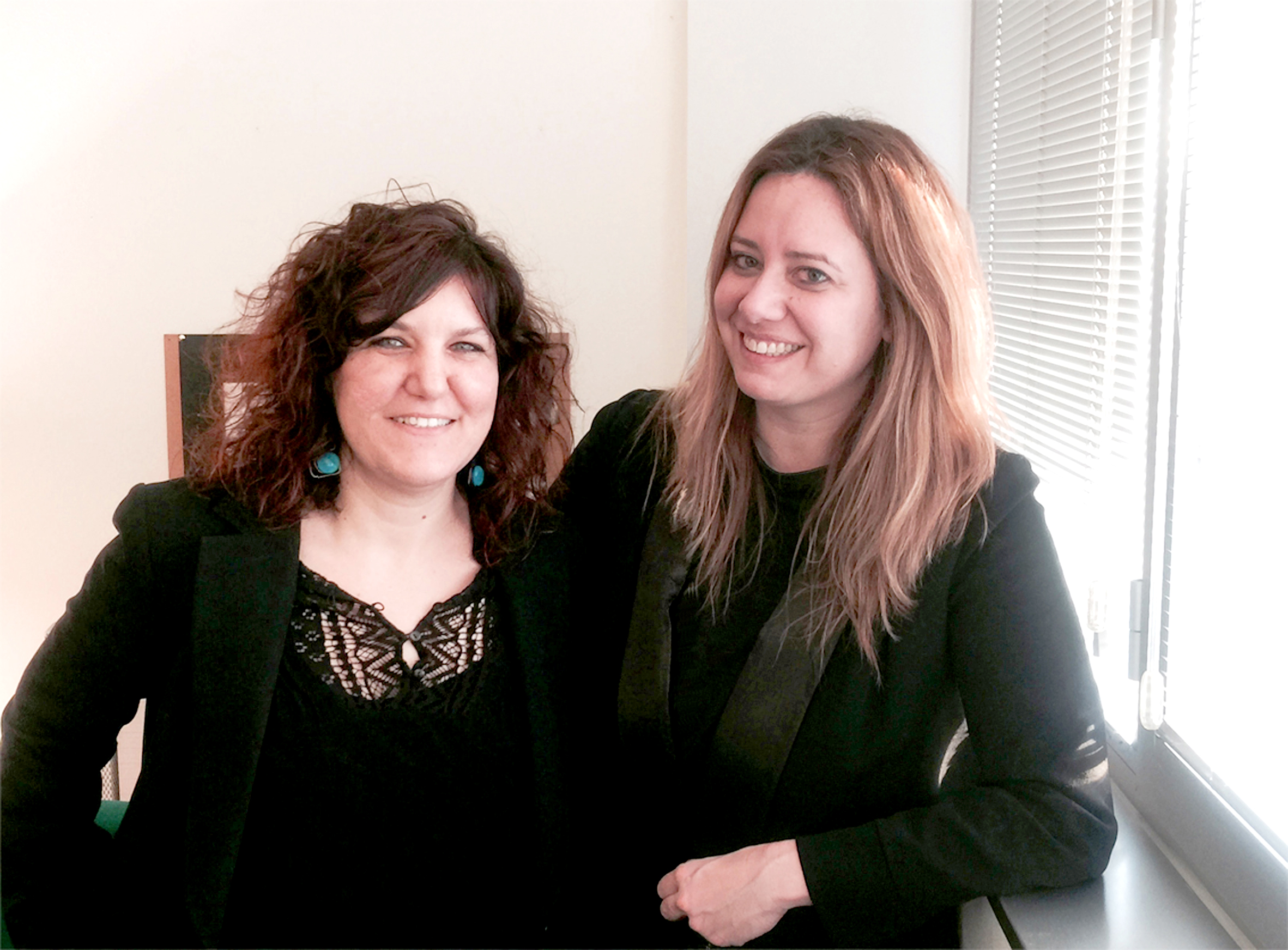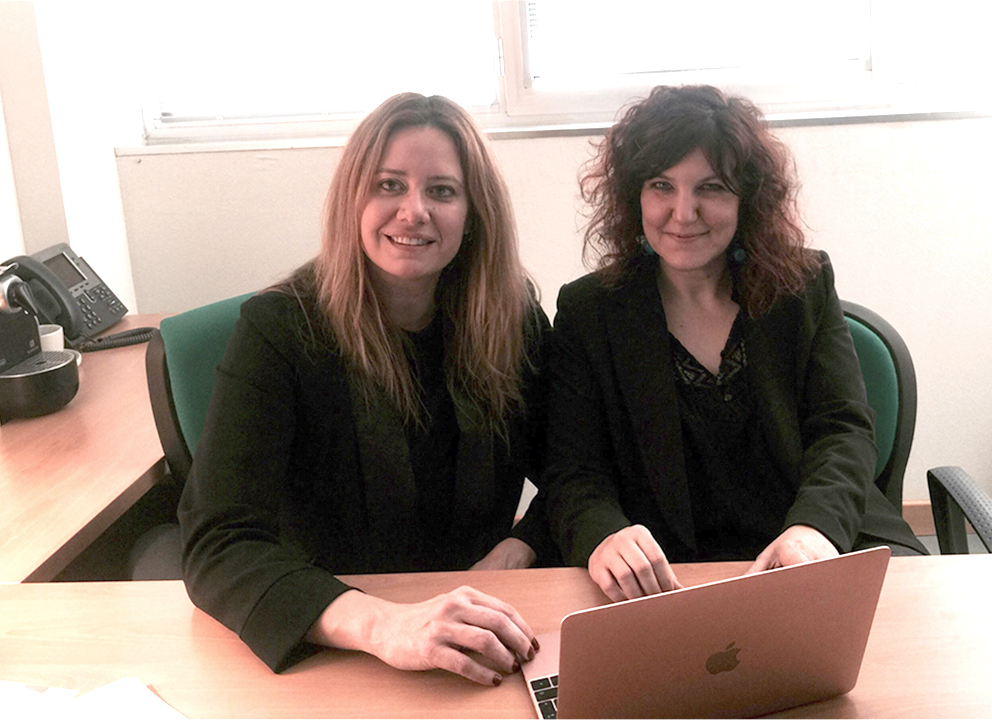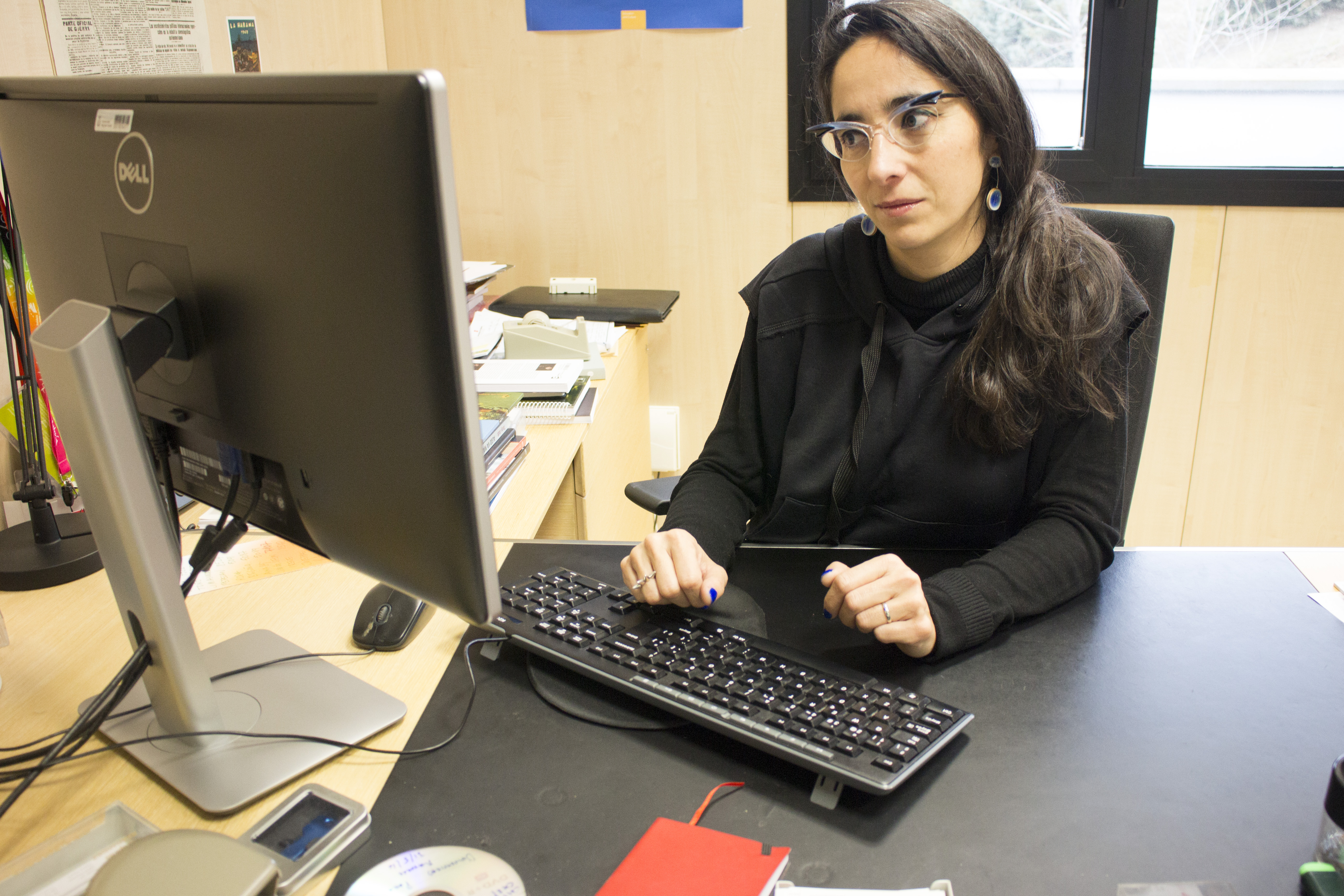Predoctoral and postdoctoral researchers, students who are doing their Final Degree Project, laboratory technicians, doctors, professors... All women with a common denominator: their passion for science. And this installment makes them the protagonists of this exhibition, promoted by the URJC Unit for Scientific Culture and Innovation. The exhibition thus joins the initiative 11 February to commemorate the International Day of Women and Girls in Science.
Science is 'also' a girl thing |
|
Bioremediation Group
from left From left to right: Pilar Abril (TFG student), Eva María Díaz (Dr. in Biology), Natalia González (Dr. in Biology) and Raquel Simarro (Dr. in Environmental Sciences)Bioremediation is a URJC research group in which women predominate. The team is made up of Natalia González, Raquel Simarro, Eva María Díaz, Carolina Vargas, Maria del Carmen Molina and Fernando Bautista. They also have the participation of various students during the development of the End of Degree or Master's Projects, as is currently the case of two other women: Pilar Abril and Violeta Lara Aguilar.The main line of research of the group is based on the study of contaminated media and the potential use of microorganisms for the elimination of contaminants. All studies have a strong component of chemical analysis, but also microbiological, not only from the applied point of view but also from the point of view of the ecology of microorganisms, their evolution, the diversity of microbial populations and interactions with other higher organisms that occur in various Mediterranean and tropical ecosystems. Currently, the group also maintains a line of research focused on the bacterial bioproduction of graphene, the new material of the XNUMXst century.
|
|
Organic Electronic and Photonic Devices Group (DELFO) |
|
LICHEN group
from left From left to right: Isabel Martínez (Professor of Botany), Pilar Hurtado (graduated in Biology and predoctoral researcher), Lidia López (graduated in Biology and laboratory technician)The LIQUEN research group is made up of four women: Pilar Hurtado, María Prieto, Lidia López and Isabel Martínez. His research focuses on the study of the ecology of epiphytic and terrestrial lichen communities, and the population biology of endangered lichen species. In addition, they develop another line focused on phylogenetic studies on different groups of lichens.These researchers are currently working in beech forests of Fagus sylvatica in Europe and forests of Nothofagus pumilio in Chile. Its objective is to know how the epiphytic communities of temperate forests are structured in both hemispheres and to analyze the inter- and intraspecific variability of different functional traits of all the macrolichen species present in these communities.
|
|
Dr. Pilar Carrasco
Pilar Carrasco, Doctor of Pharmacy and Master in Public Health with the Specialty of EpidemiologyProfessor Pilar Carrasco develops her research activity in the field of Public Health through the use of secondary information sources such as the National Health Surveys of the Ministry of Health/INE, Health Surveys carried out by Autonomous Communities, local Organizations and by the Center for Sociological Research (CIS), as well as the databases of the Hospital Morbidity Registry (CMBD).His research focuses on the same line of work, such as the role of medicine in the framework of Public Health, from which a series of works related to Pharmacoepidemiology published in journals indexed in the JCR have been derived.
|
|
LAFEMEX Laboratory
from left clockwise: Elia Escasany (Biochemistry graduate), Adriana Izquierdo (Doctor of Science), Gema Medina-Gomez (Doctor), Lucía Torres (Laboratory Technician) and Patricia Corrales (Degree in Biology)In the Laboratory for the study of metabolic phenotyping of experimental animals (LAFEMEX), recently created and directed by Dr. Medina, using genetically modified mouse models, they have identified fundamental concepts about the physiological role of a transcription factor, PPARg in the expansion of adipose tissue as a determining factor of metabolic complications associated with obesity.LAFEMEX laboratory research has considered obesity from a predominantly adipocentric perspective as the initial risk factor in the development of the different disorders of the Metabolic Syndrome in obese patients. The work carried out by these researchers has provided data to launch a complete research program on the role of lipotoxicity in states of insulin resistance and obesity at the Rey Juan Carlos University in different organs such as the pancreas, liver and kidney during different states of insulin resistance such as aging, pregnancy and metabolic syndrome.
|
|
Research Group in Analytical Chemistry applied to the Environment, Food and Drugs
from left From left to right: Mariana Silva (PhD student in Industrial Technologies), Sonia Morante (PhD in Analytical Chemistry), Isabel Sierra (PhD in Chemical Sciences) and Judith Gañán (PhD in Analytical Chemistry)The Research Group in Analytical Chemistry applied to the Environment, Food and Drugs (GQAA-MAF) is made up of seven professors, five of whom are women: Mariana Silva, Sonia Morante, Isabel Sierra, Judith Gañán and Natalia Casado, who are currently is in Madeira doing a research stay.The GQAA-MAF group works mainly on the preparation, functionalization and characterization of nanostructured silicas and also on new materials and the study of their applications in the regeneration of polluted water. They also carry out analytical applications for the determination of heavy metals and emerging contaminants in environmental samples and food. These researchers are also working on the development of advanced analytical methodologies for quality control and food safety using chromatographic, electrophoretic and electrochemical techniques.
|
|
Dr. Marta Beltran |
|
Researchers of the Faculty of Legal and Social Sciences
from left From left to right: Raquel Garrido Abia, Rosa Belén Castro Núñez, María del Pilar Laguna Sánchez, Mónica Segovia Pérez, Sara Núñez de Prado Clavell and Cristina Figueroa DomecqThis group of researchers is headed by the Dr. Pilar Laguna, dean of the Faculty of Legal and Social Sciences of the URJC and who is currently working as a researcher in the competitive project of the General Directorate of Scientific and Technical Research entitled 'The institutional framework of the fight against corruption in Spain. Is the repression of corruption in Spain being effective?'. She has collaborated with each of them in different lines of research: gender, education, entrepreneurship and the Armed Forces.Raquel Garrido Abia has a doctorate in Business Administration and Management and her work is currently carried out in the field of education closed to learning disorders in the various educational stages, and to neurodidactics. Rosa Belén Castro Núñez has a doctorate in Economics and is specialized in the application of quantitative techniques to economic analysis, and her fields of research are labor economics, especially from a gender perspective, social economy and economic development.
For her part, Mónica Segovia has a doctorate in Sociology and her lines of research include those dedicated to gender (glass ceiling, entrepreneurship, working conditions and technological gap) and specifically those developed within gender tourism, a line that she shares with Cristina Figueroa , PhD in Economics and director of the UNSCR 1325 Reload Research Project, financed by NATO.Sara Núñez de Prado has a doctorate in Information Sciences and her two priority lines of research are the Franco regime, focused on information and propaganda, and international politics with special attention to the European Union and Turkey today, as well as the its relations with the EU. |
|
Pharmacology and Nutrition Laboratory
from left 1st row to right: Dra. V. López-Miranda, Dra. N. Paniagua and Dra. MI Martín. From left to right, 2nd row: Dra. E. Sanchez, Dra. A. Bagües and Dra. R. Girón; from left to right 3rd row: Dra. R. Abalo and Dra. E. HerradónIn the Pharmacology and Nutrition Laboratory these researchers work in different fields of study. On the one hand, they focus their research on the development of new drugs and functional nutrients in the treatment of cardiovascular, metabolic and digestive pathologies.
On the other hand, these researchers work on the study and treatment of pain and neuropathies of different aetiology.
|
|
LITE Group |
|
Dr. Maria Luisa Humanes |
|
Dr. Diana Fernández Romero and Dr. Sonia Núñez Puente
from left From left to right: Diana Fernández Romero (PhD in Information Sciences) and Sonia Núñez Puente (PhD in Philology)Diana Fernández Romero and Sonia Núñez Puente (principal investigator) are researchers of the R&D project of excellence of the MINECO National Plan 'The resignification of women victims of gender-based violence in social networks: implications for the construction of vulnerability and resistance in online activism', together with Palma Peña Jiménez and Gema Pastor Andrés. This is the third consecutive project of the National Plan in which they investigate cyberfeminist practices in relation to gender violence.The result of these projects are various articles of which both are co-authors, such as 'Online activism and subject construction of the victim of gender-based violence on Spanish YouTube channels: Multimodal analysis and performativity' or 'Cyberfeminism, Participatory Activism, and Public Policies against Gender-Based Violence in Spain'. The main lines of research in which they worked are: communication, gender, gender violence and cyberfeminism
|
|
ICT Group for Biomedical Engineering
from left From left to right: Cristina Soguero, Rebeca Goya and Mihaela Chidean, doctors in Telecommunications EngineeringThe researchers Cristina Soguero, Rebeca Goya and Mihaela Chidean have PhDs in Telecommunication Engineering and work on the development of Information and Communication Technologies (ICT) for Biomedical Engineering.The main lines of research in which they carry out their studies are: risk stratification through cardiac signal processing, clinical data analysis through machine learning, electronic medical records and development of wireless sensors for gait analysis.
|
|
Dr. Esther MartinezEsther Martínez Pastor, PhD in Advertising and Public RelationsEsther Martínez Pastor has a doctorate in Advertising and Public Relations and is currently a contracted professor at the Faculty of Communication Sciences of the Rey Juan Carlos University.His main lines of research focus on the regulation of advertising, advertising of minors and emotions. |




